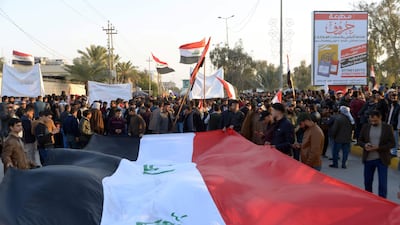The prospect of future US sanctions on Iraq - albeit still remote - could lead to disruption in drugs availability if the exchange rate takes a hit, one of the country’s leading medical suppliers has said.
Dr Zaid Al Haythem, the general manager of Al Hayat, one of the biggest importers of pharmaceuticals, said Iraqis were used to finding solutions to “survive” amid the turmoil of the last decades including the recent ISIS takeover of parts of the country.
But sanctions on Iraq could send shockwaves through the economy and cause major disruption, a fearful prospect for a country that suffered the hardships of the “oil-for-food” era and the deprivations of successive conflicts since the 1980s.
“If American did the sanctions on Iraq, sure it will impact our business. The reason why is because it will impact the central bank of Iraq. And by doing that it affects the exchange rate, making it difficult for the Iraqi patient to get their proper medicine and the government to cover the patient,” Dr Haythem said.
Al Hayat, a pharmaceutical agent, has been in business since 1996 and has offices across the country. Dr Haythem said the pharmaceutical sector before 1996 was an inefficient centrally controlled, government-run industry that he compared to Soviet Russia.
He told The National that the recent killing of Iranian commander Gen Suleimani in Baghdad and regional turmoil had so far made little impact on the sector.
“The market is very stable, it’s surprising, the business is developing and increasing.”
“In Iraq, since 1979, until now we practice to live in war, in sanctions, revolutions. The people are used to working under the tension,” he said.
Al Hayat has reported 35 per cent growth from 2017-2018 and 54 per cent from 2018-2019. In 2017 it won the representation of industry giants Pfizer, Madaus and MSD.
There are fears in Iraq that sanctions on the country related to its relationship with Iran could cripple its economy. While there has been no indication so far that US President Donald Trump could punish Iraq, sanctions could leave businesses deeply unprepared.
The economy would suffer if there was a regression back to the days of isolation under the Saddam Hussein regime. Mr Trump last month threatened Iraq with sanctions “like they’ve never seen before” after parliament backed a motion calling for the expulsion of US troops.
“I’m still working on plan A but I need to revaluate my B and C plans because anything can happen. In risk management you need to put all the bad things in front of you and put your plans accordingly so that to maintain the business and to make sure that the people do their jobs,” Dr Haythem said as he explained how he dealt with an array of potential logistical issues and unforeseen problems.
“I think, without the sanctions, this is a very big opportunity. Iraqi is a very big opportunity and a big market. There is lots of reasons for that. First of all, the government is not able to provide everything to all the population.”
He nonetheless remains upbeat about the industry despite recent instability but said more needed to be done to convince middle-class Iraqis to trust their country’s pharmaceutical industry.
“People are travelling to Jordan, to Turkey, Lebanon, to get their medicine, to get the treatment. Why are our people are travelling? Why shouldn’t we provide this product? Why shouldn’t we provide the awareness to the doctors?”


